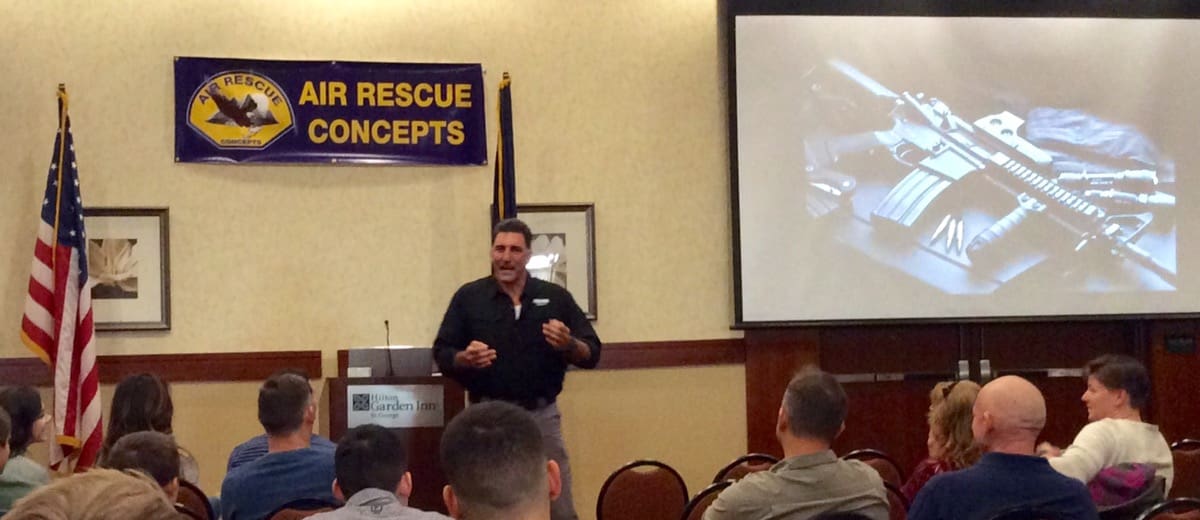I was fortunate enough to be invited to a Resiliency Training offsite with the 58th Rescue Squadron, stationed at Nellis AFB, Nevada. Led by Lt Col Stephen C, the 58th is made up of Combat Rescue Officers, Pararescuemen (PJs), SERE Specialists and support personnel from 14 different careerfields.
Squadron members and their families made the short trip from Las Vegas, to nearby Saint George, Utah, to learn about how to better deal with the stresses of combat operations, and military life in general. Pioneered by USSOCOM, resiliency training is officially known as Preservation of Force and Family. More recently, Air Combat Command, as the responsible USAF command for the Guardian Angel Weapon System, instituted a similar program for their Battlefield Airmen. Last weekend’s event is a result of this initiative.
In addition to advances in nutrition and physical training, one of the goals of the program is to provide training to recognize stress and reduce the stigma of getting help for mental issues. Stress inoculation is key in training, but preparation and awareness of what one should expect, are also crucial. Those last bits were the focus of the weekend’s agenda.
As families accompanied them, the location was a perfect way for everyone to get away from Las Vegas for a few days. Saint George offers some great opportunities for outdoor recreation and bonding. The Squadron’s various elements also had ample time to accomplish mid and long-term goals, including planning on how to make them a reality.
The first day, Operational Psychologist Maj Richard S, 432nd Wing Operational Psychologist discussed adjusting to life after deployment and how to turn the switch off from operational life when you get back home. The next day, Lt Col Richard B is the lead SERE Psychologist at Fairchild. Having served in AFSOC at Cannon AFB, NM, Lt Col B concentrated on warrior mindset.
That evening, the 58th Rescue Squadron Booster Club presented a banquet for the unit and its families. While the active duty members were TDY, the families’ meals were made possible thanks to the sponsorship of Air Rescue Concepts and Soldier Systems Daily.
The next morning, Steve Tarani presented an interactive seminar for the Squadron members and their spouses. The topic was perfect for the weekend’s focus; Resiliency training, mental toughness and preparedness.

He has been teaching for over 30 years, concentrating on protection, of people, assets and facilities. These days he usually concentrates on train-the-trainer but he also offers seminars like this to improve the safety and security for high risk audiences.
Steve is a very engaging speaker. The talk was excellent and applicable, to the military participants just as much as their families. Mindset, awareness and threat mitigation were key points of his talk. Steve tied recent real world events into the training, including last week’s vehicle and knife attack in Ohio. The talk was especially important for family members, who often find themselves alone while their spouse is deployed because Steve discussed situational awareness and how to become a hard target.
After a team lunch, Maj John T gave an engaging talk about Fatigue Management and Performance. Rather than putting all of us to sleep after lunch, he offered fatigue countermeasures and the important of understanding circadian rhythms and adjunct medications. I also now understand the difference between snuggling and cuddling. Last but not least, Lt Col Stefanie S wrapped up the day with a discussion on the importance of nutrition for Special Operations Forces.
Patrick Van Horn author of ‘Left of Bang’ wrapped up the presentations on Sunday afternoon. Patrick is the author of, “Left of Bang: How the Marine Corps’ Combat Hunter Program Can Save Your Life” and the CEO of The CP Journal, a behavioral analysis training company. His presentation centered around Combat Profiling, which is a method of proactively identifying threats based on normal behavior and other cues from one’s surroundings. Patrick explained how the foundation of combat profiling is that there are universal similarities in humans, despite cultural differences. The idea is to take a proactive approach to combat profiling by establishing baselines, identifying anomalies from that baseline and then acting on them.
All of the presentations were excellent and discussions with the members of the Guardian Angel community indicated they agreed.
The good news in all of this is that the military has become much better at recognizing and treating physical, emotional and mental stressors. Programs like this help to inoculate military personnel and their families toward these conditions, in order to help mitigate their effects. What is most important, is that personnel understand that these organizations continue to invest in their well being. Their units are there to help, and the stigma of seeking assistance is no longer there. The goal is to keep these warriors in the fight.
I want to thank the Airmen of the 58th Rescue Squadron for their hospitality. It was a joy to catch up with old friends, make new ones, and speak with Airmen and their families.













































































































